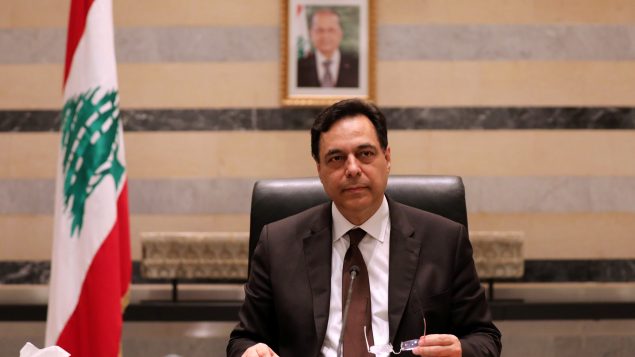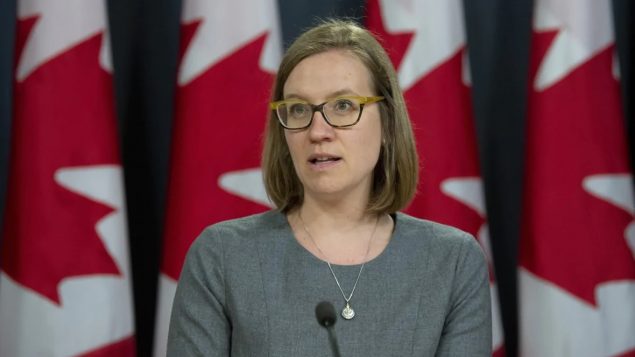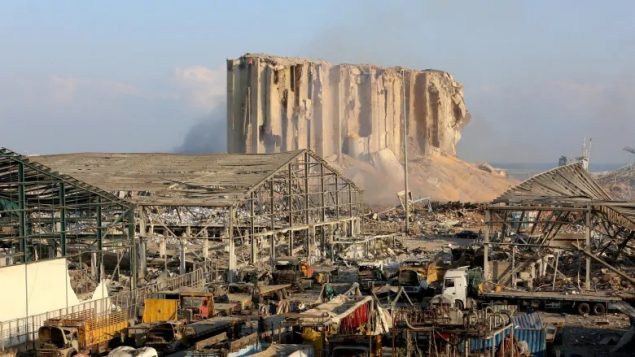Ottawa has launched a dollar-for-dollar matching fund to send additional aid to Lebanon following last Tuesday’s deadly blast in Beirut that may have killed as many as 200 people as it wounded over 6,000 others and destroyed large swaths of the city, leaving at least 300,000 people homeless.
The announcement came on a weekend when demonstrators took to Beirut’s streets in protest, two Lebanese cabinet ministers resigned, and international donors pledged nearly $300 million in emergency aid.

Lebanon’s Prime Minister Hassan Diab is pictured today at the government palace in Beirut. (Mohamed Azakir/Reuters)
In a televised address, Diab said the entire cabinet was resigning, saying the detonation of highly explosive material housed in the warehouse for seven years “the result of endemic corruption.”
In Ottawa on Saturday, International Development Minister Karina Gould made Canada’s new funding plan public, saying the federal government will match all donations made by Canadians to specific humanitarian organizations between the dates of Aug. 4 and Aug. 24, up to a maximum of $2 million.
“In the wake of this disaster, we need to act quickly to save as many lives as possible and reduce suffering,” Gould said during a news conference.
Last week, Canada committed $5 million to provide relief to Lebanon.
Of that sum, $1.5 million was pledged immediately to Lebanese and Canadian Red Cross and other partners who are acting on the ground to help meet urgent needs such as food, shelter and emergency medical services.

International Development Minister Karina Gould announced Saturday that the government plans to match all donations made by Canadians to specific humanitarian organizations to help Lebanon between Aug. 4 and Aug. 24, up to a maximum of $2 million. (Adrian Wyld/THE CANADIAN PRESS)
While officials in Ottawa are in contact with their Lebanese counterparts, “no direct aid is planned from Ottawa to the Lebanese government,” Gould told reporters on Thursday.
Sunday’s international fundraising conference–hosted by French President Emmanuel Macron–took the same line.
Most of the international aid raised on Sunday–like Canada’s–hinges on Lebanese authorities proving it will go to the right people.
The 30 donor participants warned that no money for rebuilding Beirut will be made available until Lebanese authorities commit themselves to the political and economic reforms and carry out a “credible and independent” investigation into the blast--a key demand of Lebanese crowds who took to the streets Saturday and Sunday.
The blast was apparently caused by the ignition of 2,750 tonnes of ammonium nitrate, a chemical used for explosives and fertilizer that had been stored at the port since it was confiscated from an impounded cargo ship in 2013.
The head of the International Monetary Fund said she wants an audit of the national bank before handing over any money.
“Current and future generations of Lebanese must not be saddled with more debts than they can ever repay,” Kristalina Georgieva said during the conference.
“Commitment to these reforms will unlock billions of dollars for the benefit of the Lebanese people.”
Lebanese officials have estimated the damage could amount to as much as $15 billion.

A view shows damages at the site of Tuesday’s blast in Beirut’s port area. (Aziz Taher/Reuters)
Several members of parliament stepped down in the wake of the blast and on Sunday two Cabinet ministers–Information Minister Manal Abdel-Samard and Environment Minister Demanios Kattar–resigned.
According to the 2016 national census, 92,000 Canadians reported that they were born in Lebanon, and 219,555 reported being of Lebanese ethnic origin.
With files from CBC News (Raisa Patel, Thomson Reuters ), RCI (Levon Sevunts), The Associated Press







For reasons beyond our control, and for an undetermined period of time, our comment section is now closed. However, our social networks remain open to your contributions.